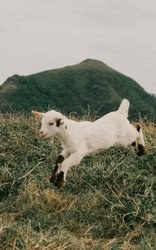The History of Coffee
Posted by Kelsey Kohls on Jul 16th 2025
The legend of dancing goats and the drink that changed the world.
Many years ago, on a warm summer day, a young goatherd named Kaldi was tending to his flock. As he walked along the green hillside of Ethiopia, he noticed a few of his goats had wandered to a wild shrub. As he drew closer, he noticed they were acting strangely... skipping and dancing joyously from place to place. Curiously, he examined the shrub and observed bright red cherries gleaming in the sunshine. Seeing that his goats were seemingly unharmed, he popped one in his mouth and immediately felt a buzz of energy. In amazement, he gathered a handfull and ran to a nearby monastery to share his findings.
At first the monks were skeptical, calling it, "Devil's beans", since it seemed to alter someone's mood. With disgust, they threw it into a blazing fire. Yet, as the cherries slowly roasted and crackled, a delicious aroma filled the air. Surprised, the monks leaned in to retrieve the beans from the fire. Observing the roasted beans, one monk decided to grind them into a fine powder and steep it with hot water. The monks found that their new brew helped them stay awake for long prayers and could be a support to their spiritual practices. This benefit made them see that maybe these weren't the Devil's beans afterall.
The legend did not remain a secret for long. By the 15th century, the drink reached Yemen then traveled to Mecca, Cairo, Istanbul, and Damascus. Coffeehouses became the places of storytelling, chess, poetry, politics, education, and music. These were the spaces where ideas and plans were born. Where revolutions were planned and books were written. Coffeehouses in Venice, London, Paris and Vienna were called penny universities because with just one penny you could order a cup of coffee, but have access to a wealth of news and education.
In the early years of America, tea reigned supreme with its tradition inherited from the British. Yet, on December 16, 1773, an event changed everything. Angry colonists boarded three ships and dumped 342 chests of tea into the Boston Harbor, protesting the Tea Act. From that point on, many swore to not drink tea again. In result, coffee became the new drink of choice and a symbol of independence.
We all have our own history of coffee from when we tried our first sip to why we drink it every morning. Memories of your grandpa drinking a cup of black coffee while filling out the crossword puzzle or mom sitting on the porch with her favorite mug. Coffee is personal and it's nostalgic.

